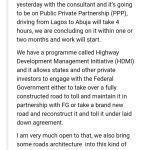The Fourth Mainland Bridge: Revolutionizing Travel from Lagos to Abuja
In a groundbreaking announcement, Dave Umahi, the Minister of Works, has revealed that the much-anticipated Fourth Mainland Bridge will transform the journey from Lagos to Abuja into a mere four-hour trip. This monumental infrastructure project is set to revolutionize travel and bring about significant economic and social benefits for Nigeria. Let’s delve into the details and explore the impact of this remarkable development.
The Fourth Mainland Bridge: A Game-Changer:
The Fourth Mainland Bridge is poised to become a game-changer in Nigeria’s transportation landscape. Once completed, this megastructure will provide a direct link between Lagos and Abuja, significantly reducing travel time and boosting connectivity. Commuters, business travelers, and tourists alike will benefit from the convenience and efficiency offered by this new route.
Shortening the Distance:
Currently, the journey from Lagos to Abuja can be a time-consuming endeavor, with travel times often exceeding ten hours. However, with the Fourth Mainland Bridge in place, this arduous journey will be reduced to a mere four hours. The bridge will span across the Lagos Lagoon, connecting Lagos Island to the mainland, and subsequently, to Abuja, the country’s capital. This shorter travel time will undoubtedly enhance productivity and open up new opportunities for trade and commerce.
Economic and Social Impact:
The Fourth Mainland Bridge holds immense potential for economic growth and development. Improved accessibility between Lagos and Abuja will facilitate the movement of goods, services, and human capital, fostering regional integration and trade. Businesses will experience enhanced efficiency in supply chains, while investors will be drawn to the newfound ease of doing business between these two major economic hubs.
Moreover, the bridge’s completion will spur infrastructural development in the surrounding areas. The ensuing growth of residential and commercial sectors will create employment opportunities and stimulate economic activity. Additionally, this project will alleviate traffic congestion in Lagos, leading to smoother commutes, reduced fuel consumption, and a healthier environment.
Engineering Marvel and Sustainability:
The Fourth Mainland Bridge is not only a marvel of engineering but also a symbol of Nigeria’s commitment to sustainability. The design of the bridge incorporates eco-friendly features, such as provisions for non-motorized transportation, pedestrian walkways, and green spaces. Furthermore, the construction process follows strict environmental regulations, ensuring minimal disruption to the ecosystem.
The Fourth Mainland Bridge represents a significant milestone in Nigeria’s quest for progress and development. With its completion, the journey from Lagos to Abuja will be transformed into a swift and seamless four-hour trip. The bridge’s economic, social, and environmental benefits are poised to propel Nigeria towards greater prosperity and connectivity. As we eagerly await its inauguration, we can envision a future where this iconic structure paves the way for a brighter and more interconnected Nigeria.




































































